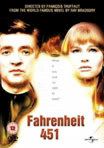1960s SF film

Fahrenheit 451, 1966, UK DIRECTED BY FRANÇOIS TRUFFAUT
Ray Bradbury said in a 1979 introduction to the story, "There is more than one way to burn a book." Similarly, there have always been two ways of looking at Fahrenheit 451: Bradbury's way, and everyone else's. The problem stems from Bradbury's original idea for the story, the dumbing down of people with television, and how it rubs up against its far more visual and inflammatory corollary, book burning: Bradbury doesn't separate the two and François Truffaut's only film in English doesn't try to either, though the visual aspect of burning books is inevitably what the viewer remembers (if the remake ever gets the green light I'd like it to set the balance right with more emphasis on the former theme than the latter; though that's hardly likely). This is inevitably a very visual film with some neat conceptual touches: the wordless opening title sequence, Julie Christie playing both women in Guy Montag's life, the symbolic salamander, the futuristic and rather soulless monorail (see it now), the stunning scene where the woman sets fire to herself and her torn-down library, and later when Montag chooses to burn down his own house rather than set fire to his secret stash of books. But the downside is some deliberately flat and uninteresting performances: there is little joie de vivre anywhere, Montag's drug-addicted wife and her friends consciously emulate the dehumanised people they see on their wall-TVs, and Montag's dichotomy often paralyses Oskar Werner into a rather dull portrayal that makes it hard to sympathise with him (Werner also had some major disagreements with Truffaut during filming). What is often forgotten about the whole Fahrenheit 451 idea is that both book and film could be seen as a bildungsroman on a huge scale: everyone who encounters it for the first time comes away a little bit changed for the better, because it's the kind of pivotal story in which Montag's re-education is not just limited to the protagonist himself, it filters into the real world too. Another thing Bradbury once said was that science fiction writers are not in the prediction business, they're in the prevention business: this is still a more realistic dystopia than Brave New World or A Clockwork Orange, plus, with our wariness of censorship in an age when religious fanatics will burn something as harmless as Harry Potter books I think it's still as relevant to today as something like Orwell's Nineteen Eighty-Four. Truffaut said early in his career that there was a certain incompatability between the words "British" and "cinema", but here he mostly did the book justice with its transposition to an English setting, though in many ways I wish his film was less staid and artificial, more immediate and lively.